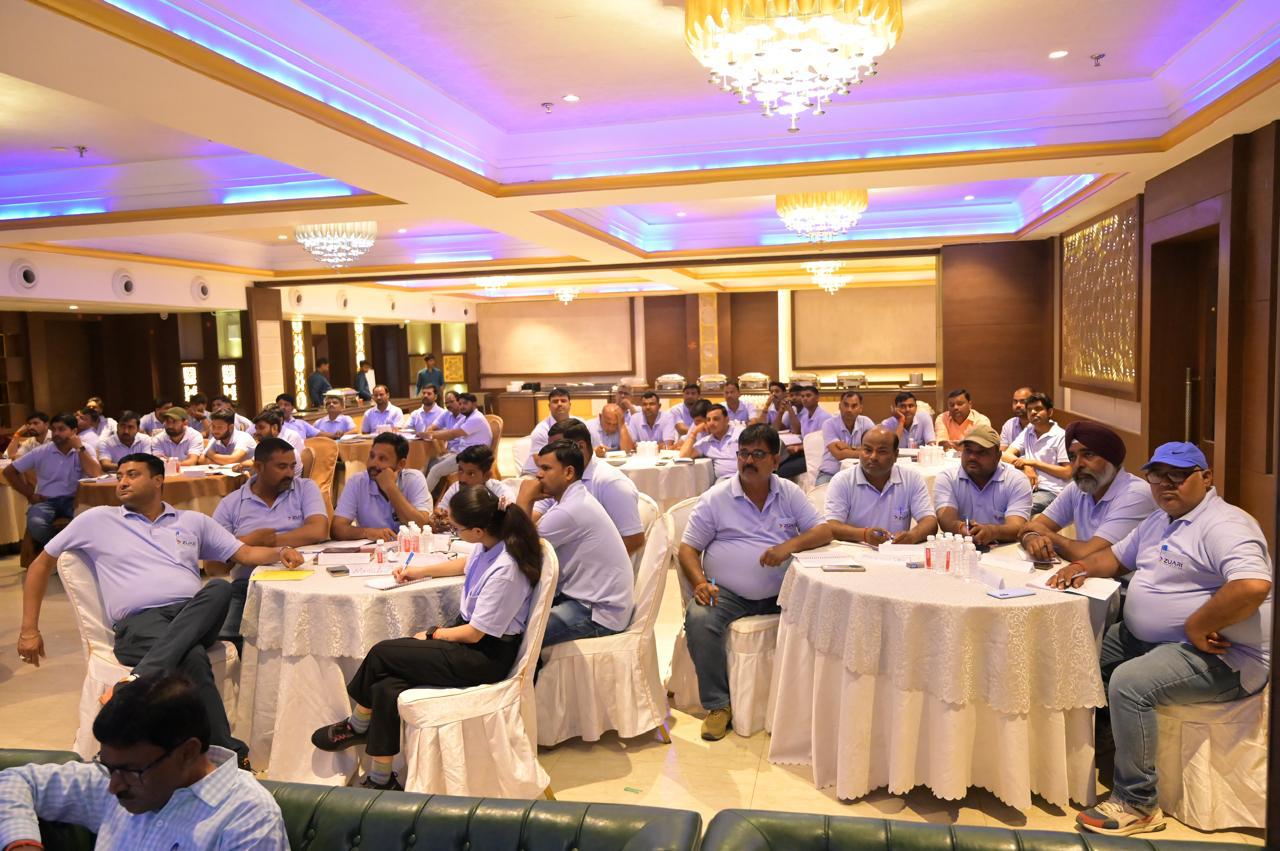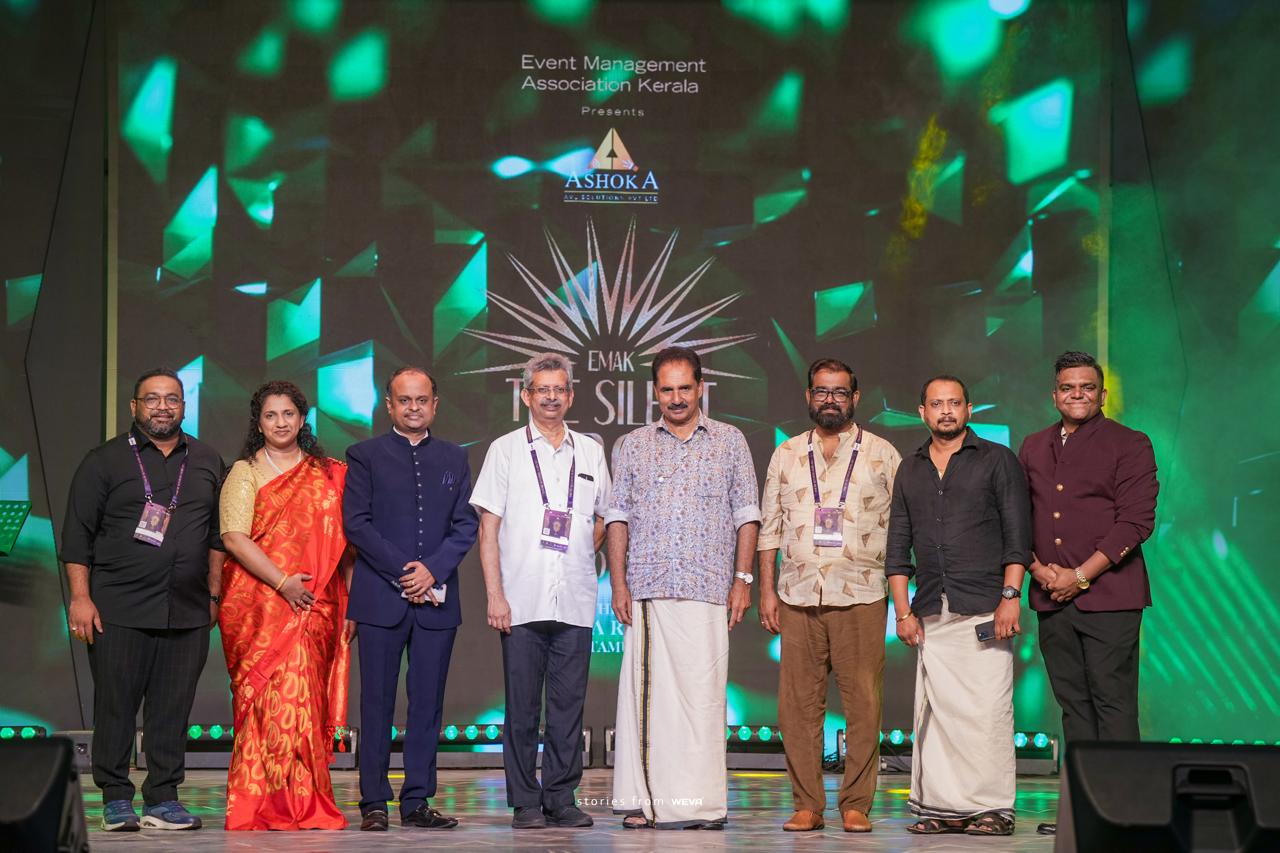Introducing The First Edition Of Foodka Culinary Honours
Kolkata, 14th April, 2025: The culinary landscape of Kolkata is set to witness a landmark celebration of taste, tradition, and innovation as the first edition of the Foodka Culinary Honours prepares to take center stage. Conceptualized and curated by two of the most passionate culinary minds — Foodpreneur Shiladitya Chaudhury and Food Historian & Culinary Content Creator Indrajit Lahiri — this highly prudent awards platform aims to being hailed as one of the most coveted recognitions in the world of food. Today the official press conference was attended by Mr Manoj Jangid, General Manager, Fairfield by Marriott, & Mr Sudesh Poddar, President, HRAEI where the categories were announced.

With Doctor’s Choice as the Title Sponsor, and presented in proud association with IHM (Institute of Hotel Management, Taratala) as the audit partner and HRAEI (Hotel & Restaurant Association of Eastern India), the Foodka Culinary Honours 2025 will honour culinary brilliance across a wide spectrum of categories, celebrating both heritage and innovation.
The awards will be conferred across the following 11 distinctive segments featuring Indian (Bengali / Biryani & Kebabs / Bhaja Bhuji (Snacks)), Chinese, Pan Asian, Continental, Global, Bakery and Patisserie, Sweets, Café, Lounge & Bar, Vegetarian & QSR (Quick Service Restaurants). There will be a special category called ‘Hall of Fame’ to be conferred to an individual or concern for their soulful contribution towards the industry.
The first edition promises to set a new benchmark in recognizing talent, consistency, and innovation in the food and beverage industry. From timeless flavours of local traditions to the bold explorations of global cuisine, the Foodka Culinary Honours aims to spotlight the individuals and institutions shaping the future of food.
Fairfield by Marriott, Kolkata proudly joins this prestigious initiative as the Hospitality Partner, where the grand celebration will unfold in the form of a glittering gala evening.
The winners across all categories will be announced and felicitated at the awards night in July 2025, in Kolkata — an evening that will bring together the who’s who of the culinary world, restaurateurs, chefs, food connoisseurs, and industry insiders.
“Foodka Culinary Honours is our humble tribute to the culinary custodians of Bengal who have been shaping the state’s food narrative with passion, innovation, and authenticity. Through this platform, we aim to celebrate not just food, but the stories, the heritage, and the relentless spirit behind it. This is just the beginning of a journey to honour excellence across kitchens — from iconic eateries to unsung heroes”, said Shiladitya Chaudhury & Indrajit Lahiri, Founders, Foodka Culinary Honours.
The journey to felicitating the best of gastronomic masterpieces is about to begin in form of Fooka Culinary Honours celebrating excellence, honouring legacy, and inspiring the next wave of culinary creativity.
Vaibhav Sagar Appointed as the General Manager
National, April 14, 2025 – Udaipur Marriott Hotel, the first hotel set to open in Udaipur under the flagship Marriott Hotels brand, today announced the appointment of Vaibhav Sagar as its General Manager. With nearly two decades of extensive experience in the hospitality industry, Sagar brings a wealth of expertise in operations, strategic planning, and team leadership.

Vaibhav-Sagar-General-Manager-Udaipur-Marriott-Hotel
Sagar began his career with Hyatt Hotels, before making a successful transition into banking, where he worked with IDBI and Kotak Mahindra Bank. His return to hospitality saw him take on leadership roles with globally acclaimed hotel chains including InterContinental Hotels Group, Hilton Hotels & Resorts, IHHR Hospitality, and Radisson Hotel Group. This cross-industry experience has equipped him with substantial expertise in marketing, finance, and performance-driven hotel operations. His strong background further complements his strategic mindset and innovative problem-solving abilities.
Prior to joining Udaipur Marriott Hotel, he served as General Manager at Le Méridien Hyderabad since 2022, where he played a pivotal role in revitalizing the hotel’s performance, significantly enhancing guest satisfaction scores, operational efficiencies, and commercial outcomes. An alumnus of Cornell University’s executive education program, Sagar also holds an MBA in Marketing and Finance.
Upon his appointment, Sagar expressed his enthusiasm: “I am honored to take on the leadership of Udaipur Marriott Hotel, a property with immense potential in one of India’s most vibrant hospitality markets. I look forward to collaborating with the talented team here to deliver exceptional guest experiences and set new standards of service in the region.”
Sagar’s proven leadership, cross-industry expertise, and commitment to service excellence position him as a valuable asset to the Udaipur Marriott Hotel team. His appointment is expected to enhance the hotel’s performance, strengthen its market presence, and deliver world-class experiences for guests.
Nestled against the majestic Aravalli Hills and overlooking the tranquil Fateh Sagar Lake, Udaipur Marriott Hotel is set to open in April 2025, marking Marriott International’s debut in the city of Udaipur in Rajasthan.
India’s AI Breakthrough: Explore Human-Like AI
Hyderabad, 14th April 2025 – Mivi, a leading Indian consumer electronics brand, today announced that it has created Mivi AI, the world’s first human-like Artificial Intelligence, aimed at revolutionising the human-AI relationship. The company, through its independent research and development, has successfully developed the human-like AI that will make technology more integrated into people’s daily lives, enhancing productivity and well-being by creating more meaningful and user-centric experiences.
While existing AI models operate in a simple on-screen question-response framework, Mivi has reimagined the interaction layer from the ground up. Leveraging the full reasoning capabilities of advanced LLMs, the company has successfully engineered a personalized conversation engine and trained its models to maintains context.

Mivi AI is being introduced to consumers through the first-of-its-kind AI Buds, enabling seamless, on-the-go interactions. Simply say “Hi Mivi” to wake the AI and begin a natural conversation. As the first product built on the Mivi AI platform, the AI Buds mark the beginning of a broader ecosystem of intelligent devices. Trained on thousands of voice samples, Mivi AI is uniquely attuned to understand and respond to a wide range of Indian accents, ensuring a truly inclusive experience.
Speaking about the breakthrough, Midhula Devabhaktuni, Co-founder and CMO, Mivi said,
“With Mivi AI, we’re not just launching a product — we’re defining the next era of human-AI interaction. This marks a transformative leap in global innovation, where AI doesn’t just respond, but truly understands, adapts, and connects on a deeply human level. It’s about building technology that feels less like a tool, and more like a companion — intuitive, emotionally aware, and seamlessly present in everyday life.”
“As the first of its kind, Mivi AI reflects our unwavering belief that world-class innovation can — and should — be built in India, for the world. This is more than a milestone for Mivi; it’s a defining moment for Indian technology on the global stage. Mivi AI Buds is the 1st manifestation of Mivi AI, and it is the beginning of many advancements. We’re proud to lead this revolution. This is India’s AI moment.”
The core technology behind Mivi AI leverages:
- Natural Language Processing (NLP): making AI proficient in understanding, interpreting, and generating human language in a way that feels fluid and natural.
- Emotional Intelligence: AI that can recognize and respond to the emotional tone of a conversation, enhancing user experience by making interactions feel more personalised and human.
- Context Awareness: AI that can remember prior interactions and understand the broader context of a conversation or situation.
Mivi AI’s USP lies in its human-like approach rather than following predefined commands and providing rigid responses. It uses developed systems which are capable of mimicking human interactions, processing complex language, recognizing context, understanding emotions and engaging in dynamic conversations. Mivi’s human-like AI can interpret finer nuances in the command language and adapt to various situations, similar to a human being.
Infra.Market Accelerates Growth in Wood Panel Industry

Aaditya Sharda, co-founder, Infra.Market said, “India’s wood panel industry is growing rapidly, driven by rising demand for sustainable and versatile materials like MDF. At Infra.Market, we are well-positioned to tap into this opportunity through our advanced manufacturing facilities, expanding product portfolio, and strong dealer network, enabling us to fuel the industry’s growth.”
LNJ Bhilwara Group Initiates the 2nd Phase Efforts
14th April 2025 Banswara/Jaipur, Rajasthan – Extending its support to a key rural transformation initiative, LNJ Bhilwara Group, a leading industrial conglomerate across business verticals including textiles, graphite electrodes, power generation, energy storage solutions, and advanced materials, launched the second phase of inspiring its workforce to contribute and support the Global Vikas Trust’s successful project for farmers’ welfare in Banswara, Rajasthan, today.

The event was graced by Shri. Ravi Jhunjhunwala, Chairman, LNJ Bhilwara Group, Shri. Mayank Gandhi, Founder of Global Vikas Trust and Shri. Rajeev Gupta, JMD, RSWM Ltd., along with other esteemed leaders of the organization.
Shri Ravi Jhunjhunwala has personally led the initiative at RSWM’s Mordi and Lodha plants in Banswara, home to the LNJ Knits and LNJ Denim units at Mordi, and the Kapaas and Greige Yarn units at Lodha, inspiring a workforce of over 3000 people to contribute for the cause.
Speaking about the impact made under the initiative, Shri Ravi Jhunjhunwala, Chairman, LNJ Bhilwara Group, said, “We are immensely moved and motivated by the tremendous support that the workforce in Bhilwara has extended to the cause. Encouraged by their willingness to extend a helping hand, we have launched the second phase of the awareness drive in Banswara and look forward to strong, enthusiastic support here as well. Shri Mayank Gandhi’s initiative to bring about rural transformation has touched the hearts of people who are coming forward to help GVT develop a lucrative and sustainable livelihood ecosystem by combining innovation with structured financial support.”
In the first phase of the initiative organized at the RSWM Ltd.’s plants in Bhilwara, a contribution of INR 50 lakhs was raised by the workforce. During the occasion, Shri. Ravi Jhunjhunwala pledged to match the cumulative contribution raised by the employees from his personal equity.
Shri Mayank Gandhi’s Global Vikas Trust led a transformation in over 4700 villages, across 27 districts in three states, by planting 5.6 crore fruit trees in the last 5 years to amplify farmers’ income tenfold. To strengthen GVT’s endeavors, Shri Ravi Jhunjhunwala is also working towards inspiring confidence and commitment from industrialists across Rajasthan to support the cause.
Elaborating upon this initiative, Shri Mayank Gandhi, Founder, Global Vikas Trust, said, “We are thankful to LNJ Bhilwara Group and Shri Ravi ji for continuously supporting us in our mission to transform the severely impacted farming community by helping them increase farmers’ income through the implementation of effective agricultural solutions. Our motivation is to empower farmers to lead a life of dignity and self-sufficiency while redefining how farming is perceived in society.”
LNJ Bhilwara is sensitizing the farming and rural community to the impactful work of Shri Mayank Gandhi, extending network support, ensuring that every farmer has access to the trees and training needed for success. LNJ Bhilwara Group will be facilitating holistic agricultural training and education to farmers at Global Vikas Trust’s Farmer Training Center, GVT Krishikul, a world-class facility where farmers, CSR leaders, corporates, and government officials converge to learn and implement pioneering agricultural solutions. This center is drawing interest from all over India, with farmers from Karnataka, Rajasthan, Madhya Pradesh, Odisha, and beyond visiting to replicate and scale GVT’s proven model.
With just ₹25 per plant, donors can directly contribute to this cause. A farmer earning Rs 37,000 per year earlier can now generate an income of around ₹4 lakh per annum within three years, with a one-time donation of just ₹30,000, securing his future and creating a life-changing impact through sustainable farming. Since 2016, the Global Vikas Trust has been working towards empowering small and marginal farmers by shifting them from low-income, high-risk crops to high-value fruit plantations, ensuring economic stability, sustainability, and long-term prosperity. With access to better crops and sustainable farming practices, average farmers’ incomes have increased from ₹38,723 to ₹3,93,986 per acre per annum. Furthermore, over 400 crore litres of water storage capacity have been developed, ensuring resilience against droughts and water scarcity.
The SPE Division of Zuari Industries Enhances Skills
Lakhimpur Kheri, Uttar Pradesh, April 14, 2025: Zuari Industries Limited (SPE Division) successfully conducted a three-day Capacity Building and Skill Development Training Program for the Cane department from April 9 to 11, 2025, at Hotel Landmark Royale, Lakhimpur Kheri. The initiative was designed to enhance technical knowledge, strategic thinking, and digital adoption among field-level teams, further strengthening the sugarcane value chain.
The training opened with a focus on foundational agronomic practices. Participants were introduced to the company’s vision and operational overview, followed by sessions on comprehensive soil management, identification and selection of cane varieties, integrated pest and disease control, and fertilizer application strategies. The first day concluded with an engaging workshop on communication and customer relationship building, aimed at enhancing interpersonal effectiveness in field operations.

The second day of training delved into advanced agronomy and the role of digital innovation in sugarcane management. Topics covered included optimized planting techniques, cane bonding policies, and marketing strategies. A dedicated session on the Saksham App highlighted how technology can improve planning and tracking in the field. Leadership-building sessions and discussions on maximizing yield and resource optimization rounded out the day’s agenda.
The final day focused on sustainability and mechanization in sugarcane farming. Key sessions explored modern irrigation and harvesting techniques, ratoon crop management, and soil and juice analysis. The concluding sessions highlighted the importance of modernization, with an emphasis on mechanized practices and tools to enhance operational efficiency. The program ended with an interactive reflection and feedback segment, encouraging participants to integrate their learnings into real-world scenarios.
Commenting on the training initiative, Mr. Alok Saxena, Executive Director & Unit Head, SPE Division, Zuari Industries Limited, said:
“At Zuari Industries, we believe in empowering our teams at every level to adopt scientific and modern approaches to farming. This training initiative is an affirmation of our commitment to capacity building and knowledge-sharing across the value chain. By bringing together the cane department including the experts and technology partners, we aim to transform conventional practices and drive sustainable growth in the sugarcane sector.”
Through such initiatives, Zuari Industries continues to lead by example in building a future-ready, skilled workforce committed to advancing India’s sugar and ethanol ecosystem.
Aakash Aath To Air 25th Anniversary Insights

ArthAlpha Strengthens Leadership with New Board Members
New Delhi, 14th April,2025 – ArthAlpha, a leading quantitative investment firm, has appointed Kalpen Parekh, MD & CEO of DSP Mutual Fund, as a Board Observer, and Kunal Bajaj, an industry veteran in investment management and financial markets, as a Board Advisor. These appointments reflect ArthAlpha’s commitment to leveraging top-tier industry expertise to drive innovation and strategic growth in quantitative finance.
Kalpen Parekh brings over two decades of experience in financial markets, having held leadership roles at ICICI, Birla Sun Life, IDFC, and DSP. As MD & CEO of DSP Mutual Fund, he has played a pivotal role in shaping long-term investment strategies and driving wealth creation. His deep understanding of market dynamics will enhance ArthAlpha’s ability to develop cutting-edge, data-driven investment solutions.
Kunal Bajaj, with over 20 years of experience across global financial institutions such as Jefferies, Credit Suisse, CLSA, Goldman Sachs (Japan) has an extensive background in capital markets, M&A, and strategic growth. As founder & CEO of Clearfunds—later acquired by MobiKwik—he built a disruptive wealth-tech platform that evolved into a diversified financial services powerhouse. His insights will be instrumental in refining ArthAlpha’s strategic direction and expansion efforts.
“We are delighted to welcome Kalpen Parekh and Kunal Bajaj to ArthAlpha. Their expertise in investment management and financial markets aligns with our vision of blending human ingenuity with technology-driven investing,” said Mr.Rohit Beri, CEO and CIO of ArthAlpha. “Their strategic insights will be invaluable as we push the boundaries of quantitative finance.”
Commenting on his appointment, Kalpen Parekh, MD and CEO of DSP Mutual Funds said, “ArthAlpha’s approach to integrating human intelligence with advanced quantitative methods is truly groundbreaking. I look forward to supporting their mission to build a transparent, data-driven investment framework.”
Kunal Bajaj added, “ArthAlpha is at the forefront of quantitative finance innovation. Their ability to merge AI-driven research with human expertise is impressive, and I am excited to contribute to their strategic growth and product innovation.”
With these strategic appointments, ArthAlpha is poised to accelerate its growth trajectory, strengthen its investment strategies, and set new benchmarks in AI-driven investing.
RITES & DP World Sign MoU for Economic Infrastructure Advancement
Gurugram, April 14, 2025: RITES Limited, a leading transport infrastructure consultancy and engineering firm, has entered into a transformative Memorandum of Understanding (MoU) with DP World, a leading provider of worldwide smart end-to-end supply chain logistics, to explore potential opportunities for collaboration in the development of trade, logistics, and infrastructure projects. The MoU aims to foster mutual collaboration by exploring joint opportunities in infrastructure development, including ports, multimodal logistics parks, free trade zones, rail connectivity projects, and logistics infrastructure services.

Signed in the esteemed presence of HH Sheikh Hamdan Bin Mohammed bin Rashid Al Maktoum, Crown Prince of Dubai and Deputy Prime Minister and Minister of Defence of the UAE; Shri Piyush Goyal, Hon’ble Minister of Commerce and Industry, Government of India; His Excellency Sultan Ahmed bin Sulayem, Group Chairman and Chief Executive Officer of DP World, along with Shri Rahul Mithal, Chairman & Managing Director of RITES Limited, and other distinguished dignitaries during the ‘CEO-Connect: Dubai-India Economic Ties & Opportunities’ in Mumbai on Tuesday, this MoU will foster collaboration in the areas of infrastructure development and trade between India and the UAE.
The Virtual Trade Corridor (VTC), launched in September 2024, is supported by MAITRI, a digital platform being developed with RITES. The VTC integrates customs, logistics, and regulatory processes into a single, seamless digital system to simplify and accelerate trade between the two nations. Since its launch, strategic workshops in India and the UAE have led to key decisions, paving the way for development of the proof of concept of the VTC using ports on both the sides such as Nhava Sheva, Deendayal, and Jebel Ali.
Commenting on the MoU, Mr. Rahul Mithal, Chairman and Managing Director, RITES Limited, said, “It is an alliance of like-minded entities, bringing together experience, expertise, and a rich legacy. By leveraging our collective strengths and resources, we are poised to create transformative synergies across key infrastructure projects, furthering our initiative to expand the footprints of ‘RITES Videsh’.”
Mr. Sultan Ahmed bin Sulayem, Group Chairman & CEO, DP World, said: “This partnership with RITES Limited marks a significant milestone in our journey towards enhancing trade and infrastructure development between India and the UAE. By leveraging the power of public-private collaboration and our combined expertise, we will bring innovation and efficiency to trade corridor development creating diversified trade routes that build resilience and unlock opportunities for everyone.”

